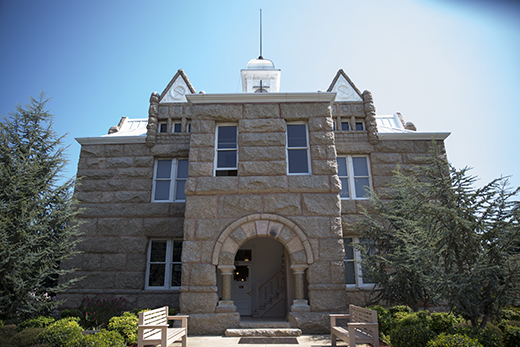
Construction of the granite Romanesque style Chickasaw National Capitol began in 1898 under Governor Robert M. Harris. The red granite used on the outside of the building was quarried on the allotment land owned by Governor Harris.
In November 1898, after seven months of construction, the new Chickasaw National Capitol was completed. A dedication ceremony took place with many dignitaries throughout Indian Territory and Texas in attendance. Although Governor Harris was responsible for the planning and development, Governor Douglas H. Johnston was the first Chickasaw Governor to hold office in the Chickasaw National Capitol. During the administration of the Chickasaw governors, the building had six offices: three downstairs and three upstairs. These offices were utilized by the Governor, the National Treasurer and the National Secretary. The Dawes Commission had an office there, and the National Treasure vault was also located in the building. The courtroom was upstairs and the Legislature met downstairs, in large rooms on the east side. The granite Chickasaw National Capitol served the Chickasaw Nation until Oklahoma statehood in 1907. At that time, the Chickasaw Nation was forced to leave their building, which was to be used by Johnston County as their courthouse.
Negotiations for repurchasing the building first started by Governor Overton James in the 1960s. Tribal ownership was reclaimed by Governor Bill Anoatubby in 1992. More than a century after its dedication, the fully restored Chickasaw Nation Historic Capitol Building, used now as a museum, stands as an enduring monument to the “Unconquered and Unconquerable” spirit of the Chickasaw Nation.
Notes:
- The Chickasaw Nation Historic Capitol Building was put on the National Register of Historic Buildings in 1971.
- Restoration of the Chickasaw Nation Historic Capitol Building was completed in 2004.
- The main exhibit area in the Chickasaw Nation Historic Capitol Building focuses on Chickasaw history from 1856 through 1907 and is located on the first floor.
- There is also information and old photographs illustrating the construction and dedication of the building.
A re-creation of Governor Douglas H. Johnston's office and the National Vault are part of the Chickasaw Nation Historic Capitol Building’s new exhibit areas.